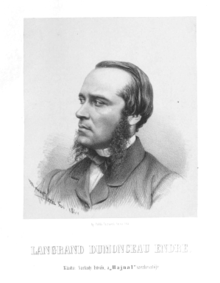You can help expand this article with text translated from the corresponding article in Polish. (April 2016) Click [show] for important translation instructions.
|
André Langrand-Dumonceau (1826–1900) was a Belgian financier, banker and entrepreneur and a major figure in European financial world of the 1860s.[1]

He was born in 1826 in the of Vossem, then part of the United Kingdom of the Netherlands. He started his career in financial services, helped by his elder brother, who worked for a Belgian branch of a French insurance company. By the age of 36 he was in control of eleven companies across Europe.[2]
He was involved in an attempt to build a "Catholic financial empire", a counterweight to the perceived Jewish dominance of the financial sector.[1][3][4] He received international recognition, including a title of count at the Papal court, and "an international reputation as a financial genius".[5] His fortune collapsed in the late 1860s, triggering a major financial-political scandal in Belgium.[6]
During the period from the 1850s to 1870 he was involved with managing over twenty companies, including banks, and insurance and railway companies, a number of which he had founded;[3] including Royale Belge.[6] He received backing from a number of notable figures, including Pope Pius IX, Emperor Franz Joseph of Austria, Napoleon III of France, and King Leopold of Belgium.[3]
His financial plan, however, was unsound, being built on using one company's equity capital to take up the loan capital of another.[4] By the late 1860s, the strain of fund transfers on his network became too much to bear.[3] In the financial Crash of 1870 he declared personal bankruptcy and fled into exile; he was accused of theft, bribery and criminal recklessness, and was condemned in absentia after a trial that ran from 1872 to 1879.[3] He died in Rome in 1900.[3]
References edit
- ^ a b Maarten Van Dijck; Jan De Maeyer; Jeffrey Tyssens; Jimmy Koppen (26 March 2013). The Economics of Providence: Management, Finances and Patrimony of Religious Orders and Congregations in Europe, 1773– C 1930. Leuven University Press. p. 179. ISBN 978-90-5867-915-4.
- ^ Accademia ligure di scienze e lettere (2003). Atti della Accademia Ligure di Scienze e Lettere (in Italian). Accademia Ligure di Scienze e Lettere. p. 154.
- ^ a b c d e f Michael Saffle; Rossana Dalmonte (2003). Liszt and the Birth of Modern Europe: Music as a Mirror of Religious, Political, Cultural, and Aesthetic Transformations : Proceedings of the International Conference Held at the Villa Serbelloni, Bellagio (Como) 14–18 December 1998. Pendragon Press. p. 80. ISBN 978-1-57647-027-5.
- ^ a b Gerald Posner (3 February 2015). God's Bankers: A History of Money and Power at the Vatican. Simon & Schuster. p. 16. ISBN 978-1-4391-0986-1.
- ^ Cameron, Rondo E. (1 January 1962). "Langrand-Dumonceau, promoteur d'une puissance financière catholique. Vol. I, Années obscures—Montée. By G[uillaume] Jacquemyns. (Publication of the Institut de Sociologie Solvay, Centre d'Histoire Economique et Sociale.) Brussels: Université Libre de Bruxelles, 1960. pp. 320. 260 F.B.". The Journal of Economic History (in French). 22 (1): 115–116. doi:10.1017/S0022050700102633. ISSN 1471-6372. JSTOR 2114285.
- ^ a b Els Witte; Jan Craeybeckx; Alain Meynen (2009). Political History of Belgium: From 1830 Onwards. Asp / Vubpress / Upa. p. 64. ISBN 978-90-5487-517-8.